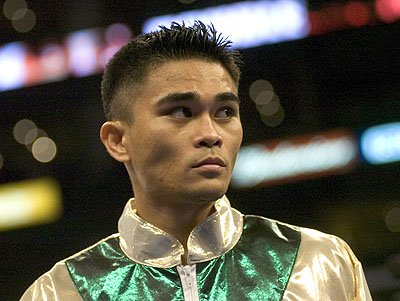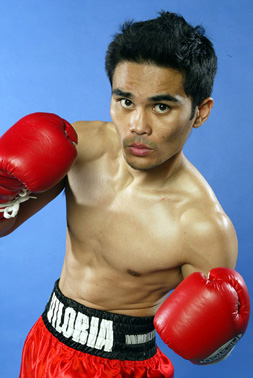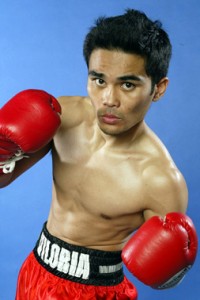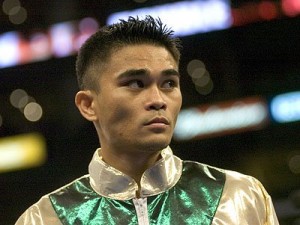
MANILA, Philippines — It isn’t often that you’ll find a world champion entering his first title defense as the underdog, but that’s the situation WBO flyweight titleholder Brian Viloria finds himself in as he approaches his showdown with THE RING’s junior flyweight champ Giovani Segura this Sunday, Dec. 11, (Saturday evening in the U.S.) at the Yñares Sports Arena in Pasig City.
Viloria, of Waipahu, Hawaii, twice held major 108-pound titles before stepping up to flyweight to defeat Mexico’s Julio Cesar Miranda in his most recent outing to earn a belt in his second division. The 31-year-old veteran lost his junior flyweight titles in his second defense of each reign. Most observers are anticipating that this title run will end earlier than the previous ones because of the relentless pressure and KO power of his 29-year-old challenger.
The fight will be aired by the GMA Network in the Philippines, and on pay-per-view in the United States (Integrated Sports, $29.95, 8:00 p.m. EST).
Viloria (29-3, 16 knockouts), a memember of 2000 U.S. Olympic squad, fully embraces the dark horse role given to him by odds makers and most of the media.
“I love being the underdog,” Viloria, told RingTV.com following a light workout at the Punch Out Boxing Club in Makati City. “It motivates me to get ready for a fight. I love fighting when everybody is doubting me. I love trying to prove them wrong.”
Viloria’s longtime assistant traienr Ruben Gomez agrees believes the gifted boxer-puncher is at his best when his back is against the wall.
“I think it’s a good situation to be in, being expected to lose,” said Gomez, who has been with Viloria since the Filipinio-American first turned professional. “But to us, it’s not going to be a surprise when they raise Brian’s hand in victory because we came here to win and that’s exactly what’s going to happen.”
Viloria is no stranger to being the underdog. Prior to his second world title winning effort against Ulises Solis, Viloria was all but written off as a signature win for Solis’ ninth title defense. Instead Viloria won, punctuating the performance with an 11th-round knockout that would be at home on any highlight reel.
The opposite side of the coin is that Viloria sometimes loses fights he’s supposed to win.
All of Viloria’s defeats — to Carlos Tamara, Omar Nino Romero and Edgar Sosa — came unexpectedly, the result of focus issues, Viloria’s team claims.
“Brian should be working on his fifteenth title defense now,” said Gomez. “I think those fights that he lost, he should have never lost them.”
Viloria finds himself in this difficult spot not by choice, but as a result of his challenger’s mandatory position with Viloria’s predecessor Miranda. Viloria was allowed to cut in front of Segura (28-1-1, 24 KOs) and fight Miranda with the understanding that he’d have to immediately face the slugger from Bell, Calif., by way of Guerrero, Mexico.
The Viloria-Segura clash was expected to take place earlier in the fall but was delayed due to a cut over Viloria’s right eye suffered in the Miranda fight.
Viloria has already upset the odds just by being in this position. Viloria’s career was in serious doubt following his loss last January to Carlos Tamara when, ahead on the scorecards, Viloria’s conditioning fell apart, causing him to lose by a12th-round stoppage. Afterwards he collapsed in the dressing room from exhaustion, a product of the difficulty he experienced making the 108 pound weight limit.
Then, just two weeks before his return bout against Omar Soto six months later, Viloria’s trainer Roberto Garcia abandoned Viloria to join Nonito Donaire Jr., leaving Viloria to find a new trainer. Mario Morales, who is now Viloria’s head trainer, isn’t exactly new, having worked with Viloria early in his career.
“I’ve gone up and down so many times in my career, it is like a roller coaster,” said Viloria. “The resiliency of my career, that’s what it is. Right now I’m back on top as a world champion and I want to stay there. It’s really hard to become a world champion, but it’s ten times as hard to stay as a world champion. The path of my career, it’s what made me today. I think I’m a complete fighter now.”
Viloria vs. Segura Promo
Viloria is expected to be the crowd favorite against Segura, not because the Philippines is a second home to him, but a first home. Viloria was raised by his grandparents from six months to the age of six in the Philippine province of Ilocos Norte on the island archipelago’s most northwestern corner. A dual citizen of the Philippines and America, Viloria’s first language is Ilocano, a dialect of Filipino spoken exclusively in that region. He didn’t learn to speak English until rejoining his parents in Hawaii to begin school.
This will be Viloria’s fifth appearance in the Philippines.
Segura, who is rated number nine on THE RING’s pound-for-pound list, conceded at Wednesday morning’s press conference that Viloria was “a more complete fighter.” He didn’t have Viloria’s pedigree, having picked up the sport at the advanced age of 18. He turned pro after just 11 amateur bouts, while Viloria represented the United States in the 2000 Summer Olympics.
What he does have over Viloria are two signature knockout victories over the previously-unbeaten ring legend Ivan Calderon in 2010 and 2011 that have catapulted him to a pedestal that Viloria has never reached.
The two have crossed paths a number of times over the years, working alongside each other at the Azteca Boxing Club in Bell, Calif., and as sparring partners for five different fights. Segura’s team have said that they got the better of the action and as a result have a mental edge over Viloria. Viloria and company dismiss it as “just sparring.”
“Sparring is like scrimmage; You don’t give your best foot forward,” said Viloria. “You just try to work on things you need to work on. Sometimes it gives you a false sense of saying, ‘Alright, he fights this way’ or ‘He fights that way, that’s the way I’m gonna fight him.’ It really kind of throws you off when you switch it off. The real fight is a whole different level than a sparring session.”
“Giovani is full speed ahead, whether it’s sparring or it’s fighting,” said Gomez. “He spars pretty much the same way he fights. I don’t particularly like that type of sparring because if somebody hits you hard, you’re going to hit him hard and that just escalates.”
What Viloria believes the sparring sessions have done is given each man a sense of the way the other likes to fight, something that he feels will work to his advantage.
“He has that one-dimensional style, he’ll try and corner you and slug you out into submission,” said Viloria. “I’m so versatile in this sport, I think that’s going to be the difference in this fight. I don’t think Segura is going to figure out what style I’m going to bring into the ring. I’m going to have to switch it up and make him think and keep him on his toes.”
Many people who are picking Segura over Viloria do so out of a lack of faith in Viloria’s conditioning late in fights. Viloria himself acknowledges that conditioning has been an issue in past fights and says that has been their primary focus in training camp. Running the mountains of Southern California — as well as the additional four pounds of the flyweight division — have given Viloria confidence that his issues of the past are just that. The past.
“I’m really confident that I’m going to look at the twelfth round like I’ll look in the first round,” said Viloria. “I made the weight easy, I’m eating right, sleeping right. There’s not going to be any excuses in this fight.
“I want to go in there and show the world that Brian Viloria is a new Brian Viloria in this weight division and I want to stay world champion for as long as I can.”
http://ringtv.craveonline.com/blog/170601-brian-viloria-qi-love-being-the-underdogq
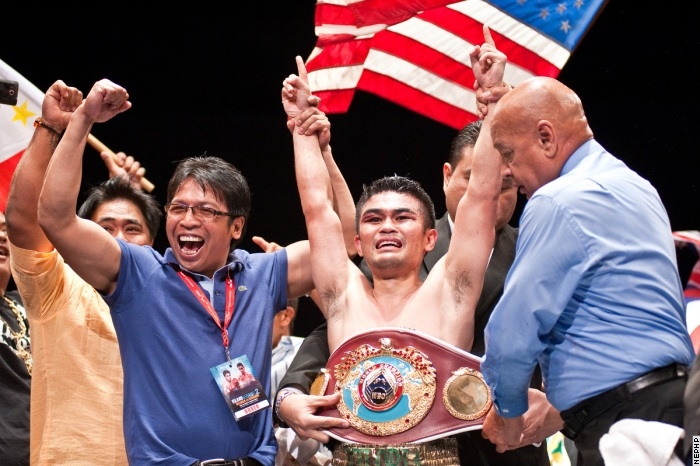
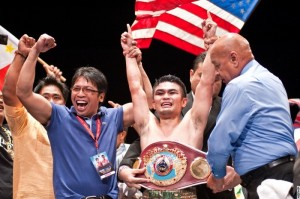 World Boxing Organization flyweight champion Brian Viloria defends his title against Mexico’s Omar Nino Romero in Manila on April 1 in a fight card presented by Solar Sports.
World Boxing Organization flyweight champion Brian Viloria defends his title against Mexico’s Omar Nino Romero in Manila on April 1 in a fight card presented by Solar Sports.

